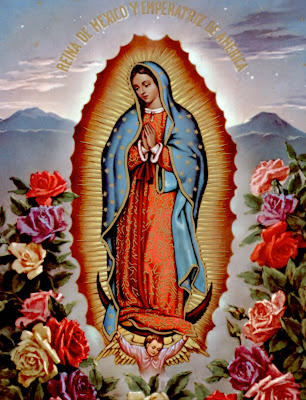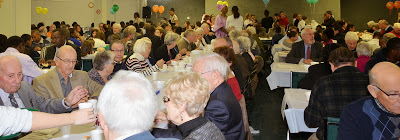 |
| McNally Building, Saint Mary's University, which included the Jesuit Residence 1940-81 |
A few days ago, the oldest Jesuit in English-speaking Canada passed away a few months short of his hundredth birthday. He was stationed in Halifax for more than fifty years so I got to know him during my time teaching at Atlantic School of Theology (1975-81) and later when I returned as archbishop there (1998-2007). During part of the first period he was my next door neighbour on the corridor of the residence at Saint Mary’s University and during the latter period his gentility and deference to church authority ensured that he would be effusive in his welcome and most gracious to me at all times.
A chemist by training, he studied fog (not a bad subject in Halifax!) and often said when going out for a walk that he was going to conduct research. May the Lord God whom he served all these years as a scientist-priest (a most challenging ministry) lift the fog of our human condition and cause him to enter into the bright light of the splendour of Christ, King of the Created Universe and all its Peoples.
R.I.P. Here are the details of his short obituary.
Father James W. Murphy, S.J. died peacefully on Friday, November 22, 2013 at Rene Goupil House, Pickering, ON in his 100th year, 80th year of religious life and 66th of priestly ordination.
Born on March 30th, 1914 in Saint John, New Brunswick, James Wallace Murphy entered the Society of Jesus in 1934 and was ordained a Jesuit priest in 1947 in Colombia.
After a year of special studies in Chemistry in Toronto he began his major life's work at Saint Mary's University in Halifax as Lecturer and then Professor in Chemistry, ending his work there (1954-2006) as Professor Emeritus.
A man of faith and a scientist, he moved in 2006 to La Storta in Pickering, Ontario where he devoted to a ministry of pastoral prayer for the Church and his Jesuit Order.
A wake service will be held this evening 7-9 p.m. at St. Ignatius Chapel, Manresa Spiritual Renewal Centre, Liverpool Road North, Pickering, ON; with Mass of the Resurrection there on Tuesday, November 26th at 11 a.m., with interment to follow at the Jesuit Cemetery, Guelph at 2:30 p.m.
* * * * * *
LA PAROISSE SAINT-REMI FETE SES 50 ANS
50e Anniversaire de la Paroisse St-Remi—le 24 novembre 2013
Solennité du Christ-Roi (Année « C ») —Clôture de l’Année de la Foi
APPELÉS À VIVRE DANS LE ROYAUME
[Textes: 2 Samuel 5, 1-3; [Psaume 121 (122)]; Colossiens 1, 12-20; Luc 23, 35-43]
Je suis heureux de venir vous rencontrer aujourd'hui et de prendre part au 50e anniversaire de votre paroisse.
Depuis cinquante ans, cette église est témoin de la vitalité de la foi chrétienne des catholiques francophones de l’Ouest d’Ottawa. C’est une vitalité que j'admire et qui m’amène à vous dire, en m'inspirant d'une lettre de l'apôtre saint Paul :
« Je rends grâce à Dieu à cause de vous tous. Je rends grâce à cause de votre foi qui a été et demeure active. Je rends grâce à cause de votre charité qui s'est beaucoup donné de peine et s'en donne encore. Je rends grâce pour l'espérance qui est en vous et qui tient bon malgré les difficultés et les vents contraires » (Inspirés de 1 Thessaloniciens 1, 3).
En célébrant aujourd'hui les 50 ans de votre communauté chrétienne, vous rendez grâce au Seigneur pour ces pasteurs, ces chrétiennes et ces chrétiens qui ont donné le meilleur d'eux-mêmes pour que la paroisse Saint-Remi devienne et demeure une communauté vivante, heureuse de croire en ce Dieu fait homme Jésus, le Christ, le Roi de l'Univers.
Réjouissons-nous et rendons grâce à Dieu. Il ne faut pas abandonner. Il ne faut pas ralentir le pas. Il ne faut pas que nous nous reposions sur nos lauriers.
Il faut, au contraire, que nous poursuivions notre route avec l'entrain qui nous caractérise, avec la foi qui nous anime. L'avenir, Dieu seul le connaît. Pas nous. Il y a cependant une chose que je sais et que vous savez tous: c'est que Dieu compte sur nous... compte sur moi et sur vous, pour que le nom de son Fils Jésus, pour que son message d’amour et de solidarité, soient annoncés à Ottawa: dans les familles, dans les lieux de travail et de loisirs... partout!
Au début de la vie de l'Église, Jésus n'a pas travaillé seul. Il a regroupé autour de lui des personnes en qui il a mis sa confiance, à qui il a donné des responsabilités. Jésus continue à œuvrer par l'intermédiaire de celles et de ceux qui croient en lui et qui l'aiment.
Dans la lettre aux Colossiens que nous venons d’entendre, Paul, commence par une prière de reconnaissance et d’action de grâce pour le rayonnement de la foi de ces chrétiens qu’il n’a jamais rencontré puisqu’il n’est jamais allé à Colosses; il a seulement entendu parler d’eux. (1,3)
C’est à cela que la liturgie de ce jour nous invite : terminer cette année liturgique, cette Année de la foi, en rendant grâce parce que dans le Christ Roi de l’Univers, nous sommes des pécheurs pardonnés. « Il nous a rendu capables ». Nous étions incapables d’aller à Dieu et c’est la venue du Fils qui rend possible l’accès plénier à Dieu, « D’avoir part à l’héritage des saints ».
Jésus est le premier dans le monde nouveau des ressuscités. Voilà à quoi nous sommes appelés, destinés. Jesus nous a arraché des ténèbres et nous a fait entrer dans son Royaume. Dieu nous introduit dans sa sphère divine. Alors que se termine l’Année de la foi, réalisons plus que jamais que ce n'est pas en vain que nous mettons toute notre foi dans le Seigneur, Lui qui a vaincu la mort et des ténèbres.
Depuis déjà plusieurs années, vous cherchez ici, à Saint-Remi, à vivre de la spiritualité de l’intendance chrétienne. Cette manière de vivre en communauté est bien enracinée dans l’enseignement de la Bible, et en particulier dans la vie de Jésus. Son dynamisme profond c’est la gratitude. C’est une spiritualité vraiment eucharistique. Elle répond au besoin que nous portons dans notre for intérieur de remercier Dieu pour les grâces abondantes que nous recevons de Lui.
Elle reconnaît que tout ce que nous avons, et tout ce que nous sommes vient de Dieu. Nous sommes des administrateurs, des intendants et non des propriétaires, d’une multitude de biens qui nous sont confiés.
Ces dons sont souvent identifiés comme notre temps, nos talents, notre trésor. Nous avons à les accueillir dans la gratitude, à veiller sur eux et les cultiver de façon responsable, à les partager dans la justice et l’amour, et à les faire fructifier devant Dieu pour que vienne son règne.
Aujourd’hui, en fêtant le Christ Roi, nous voyons bien que la royauté de Dieu n’a rien à voir avec les images habituelles que nous avons des rois. En effet, à nos oreilles, le titre de roi a des relents de triomphe, de puissance, de richesse, de privilèges, d’honneurs.
Or Jésus lui-même s’est expliqué tout à fait clairement sur sa conception à Lui d’être roi la veille de sa mort, au cours de son dernier repas : « Les rois des nations leur commandent et ceux qui exercent l’autorité se font appeler bienfaiteurs. Pour vous, qu’il n’en soit pas ainsi. Au contraire! Que le plus grand parmi vous se comporte comme le plus petit, et celui qui gouverne, comme celui qui sert… Moi, je suis au milieu de vous comme le serviteur. » (Luc 22,26)
La seule royauté de Jésus, c’est celle d’être « serviteur de Dieu ». C’est pour l’amour, c’est pour le service… qu’Il est le premier. C’est de l’amour qu’Il est vraiment roi. Telle est la royauté de notre Dieu. Oui, notre Dieu est un Dieu dont le règne est fait de douceur. Jésus règne sur les cœurs qui se laissent aimer. Le bon larron est notre modèle.
Seigneur, nous te remercions pour cette Année de la foi, pour ce temps de grâce. Nous croyons, Seigneur, mais nous te demandons d’augmenter notre foi. Que cette foi dispose nos cœurs à se purifier de tout ce qui nous éloigne de toi, afin que nous puissions proclamer avec saint Paul qu’il n’y a qu’un seul Seigneur, une seule foi, un seul baptême, un seul Dieu et Père de tous, qui règne au-dessus de tous, par tous, et en tous (Éphésiens 4,5-6).
Alors que les célébrations de la confirmation commenceront bientôt dans votre paroisse, il est bon de se rappeler que depuis le jour de la première Pentecôte, il nous est demandé de croire à la force de l'Esprit Saint qui habite en nous. Il nous est demandé de travailler ensemble. Il nous est demandé de nous faire mutuellement confiance et de mettre en œuvre des projets qui peuvent paraître parfois modestes mais qui apporteront, dans notre milieu, un peu d'espoir et de réconfort.
Il nous est demandé d'aimer assez le Christ et son Évangile pour proposer à ceux et celles qui ne les connaissent pas, ou les connaissent peu, ou les connaissent mal de s’approcher de Lui. Il nous est demandé de faire voir, autour de nous, que la vie selon l'Évangile, que l'amour vécu à la manière de Jésus, n'est pas un rêve mais un idéal à poursuivre patiemment et qui rend heureux.
Que l’Esprit Saint qu'il fasse de vous, paroissiennes et paroissiens de Saint-Remi, des disciples heureux de croire et heureux de faire retentir autour d'eux un Évangile qui, depuis deux mille ans, est porteur de lumière et d'espérance. Soyez toujours de bons intendants! C'est votre mission; que ce soit aussi votre fierté.
Que le Christ Roi vous bénisse. Qu'il vous aide à être de bons et de joyeux témoins de l'Évangile. Qu'il bénisse ceux et celles que vous aimez. Qu'il bénisse tous les membres de votre paroisse. À lui tout honneur et toute gloire, pour les siècles des siècles. Amen.
[Photos: Ronald Brisson]

.JPG)
































_crest%5B1%5D.png)


























